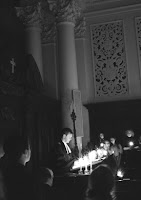Shostakovich and candles
 "The Quartet was always performing Shostakovich cycle in the following order:
"The Quartet was always performing Shostakovich cycle in the following order:nn. 2,1 ;3 (first quartet is too "modest" to start the cycle with, while n.2 starts with Ouverture). This proved to be good for beginning.
nn.4,6;5
nn.9;7,8
nn.10,11;12
nn.14,13;15 (with candles where permitted)."
The convention of performing Shostakovich's Fifteenth Quartet by candlelight puzzles me. There seems to be no real authority for it. Yes, the Fifteenth Quartet was written in 1974, the year before the composer's death, and it seems to reflect his state of health and mind. The stark and brooding tone of this E flat minor work makes it sound most like a last will and testament. But Shostakovich was an agnostic, and he derived no comfort from religion. His composition deals with the harsh realities of the 20th century from the purely human perspective, and the only consolation he can offer is the supremacy of the human spirit. It is very difficult to see the connection between the austere and harsh world that Shostakovich's music inhabits, and the tradition of candlelight with its connotations of midnight vigils and high church. But there is a strange connection, but one which I am sure Shostakovich never envisaged.
The Office of Tenebrae is celebrated during Holy Week, in the hours of darkness before dawn. A triangular candlestick, with fifteen candles, symbolising the eleven faifhful Apostles, the three Marys and Christ and corresponding to the number of psalms recited, is placed at the side of the altar. After each psalm one of the candles is extinguished, and after the Benedictus the candle on the top is alone not extinguished, but it is removed and placed behind the altar, and brought out at the end of the service. While that canticle is sung the six candles on the altar are also extinguished, as well as those above the rails. The Office ends with the singing of the Miserere, after which the last candle is placed behind the altar, plunging the church into darkness. The uncanny thing is that the six last candles correspond to the six linked adagio movements of the Fifteenth Quartet. Pure coincidence presumably, but a thought provoking one.
and corresponding to the number of psalms recited, is placed at the side of the altar. After each psalm one of the candles is extinguished, and after the Benedictus the candle on the top is alone not extinguished, but it is removed and placed behind the altar, and brought out at the end of the service. While that canticle is sung the six candles on the altar are also extinguished, as well as those above the rails. The Office ends with the singing of the Miserere, after which the last candle is placed behind the altar, plunging the church into darkness. The uncanny thing is that the six last candles correspond to the six linked adagio movements of the Fifteenth Quartet. Pure coincidence presumably, but a thought provoking one.
Doulce Mémoire's recording of Cristóbal de Morales' Office de Ténèbres on Astreé is recommended, as is the Rubio Quartets super-budget set of the complete Shostakovich Quartets on the ubiquitous Brilliant Classics.
Image credits - Shostakovich: UM Research
Candlelight: Harvard University Gazette
Image owners - if you do not want your picture used in this article please contact me and it will be removed. If bandwidth is a problem with your permission I will host your image.
Please report any broken links, missing images, or other errors to - overgrownpath at hotmail dot co dot uk
If you enjoyed this post take an overgrown path to Recycling Shostakovich and Beethoven






Comments
I'm immersed in William Vollmann's 800-page novel
EUROPE CENTRAL, in which the composer is one of the main figures.
However, it's Vollmann's fictional Shostakovich, which even further disguises the true story.
In the lengthy notes (imagine, a novel with 50 pages of footnotes!), Vollmann apologizes to the Shostakovich family for any grief he may have caused with his fanciful tale of a randy composer.
Still, I don't know what to make of it.